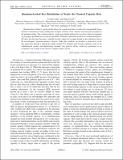Quantum-Locked Key Distribution at Nearly the Classical Capacity Rate
Author(s)
Lupo, Cosmo; Lloyd, Seth
DownloadPhysRevLett.113.160502.pdf (143.9Kb)
PUBLISHER_POLICY
Publisher Policy
Article is made available in accordance with the publisher's policy and may be subject to US copyright law. Please refer to the publisher's site for terms of use.
Terms of use
Metadata
Show full item recordAbstract
Quantum data locking is a protocol that allows for a small secret key to (un)lock an exponentially larger amount of information, hence yielding the strongest violation of the classical one-time pad encryption in the quantum setting. This violation mirrors a large gap existing between two security criteria for quantum cryptography quantified by two entropic quantities: the Holevo information and the accessible information. We show that the latter becomes a sensible security criterion if an upper bound on the coherence time of the eavesdropper’s quantum memory is known. Under this condition, we introduce a protocol for secret key generation through a memoryless qudit channel. For channels with enough symmetry, such as the d-dimensional erasure and depolarizing channels, this protocol allows secret key generation at an asymptotic rate as high as the classical capacity minus one bit.
Date issued
2014-10Department
Massachusetts Institute of Technology. Department of Mechanical Engineering; Massachusetts Institute of Technology. Research Laboratory of ElectronicsJournal
Physical Review Letters
Publisher
American Physical Society
Citation
Lupo, Cosmo, and Seth Lloyd. "Quantum-Locked Key Distribution at Nearly the Classical Capacity Rate." Phys. Rev. Lett. 113, 160502 (October 2014). © 2014 American Physical Society
Version: Final published version
ISSN
0031-9007
1079-7114